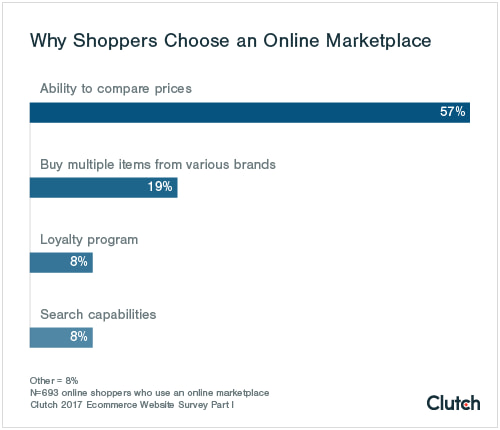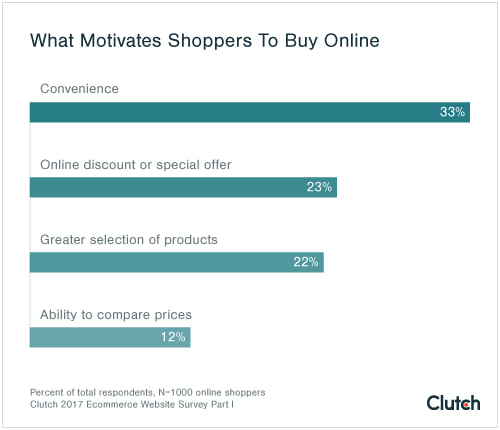
It seems like hardly a week passes without a story about new developments in e-commerce. Robots work alongside people at new Amazon warehouses, and sketch comedy shows like IFC’s Portlandia riff on the boom in mail-order art on online jewelry. You can now subscribe to everything from snacks to dog toys to razors, and the supplies you need simply show up at your door. As online marketplaces like Amazon have grown and new trends in e-commerce emerge constantly, many small business owners are beginning to question whether they should sell products on their own online stores, marketplaces, or both, in the form of a multi-channel e-commerce strategy. The following 5 questions will help you evaluate your business and determine whether a multi-channel e-commerce strategy is right for you.
Delivering Business Results: Our Digital Marketing Case Studies
1. Where Do Your Customers Shop?
Many articles emphasize the importance of evaluating other e-commerce websites to understand your competition. While this is important, it leaves out another key source of potential competition: online marketplaces such as Amazon, eBay, and Etsy, which play a significant role in e-commerce multi-channel strategies.
According to a new survey on how to engage online shoppers by Clutch, a Washington DC-based ratings, and reviews firm, nearly 70% of online shoppers head straight to an online marketplace when they want to purchase something online. Understanding the dynamics of multi-channel commerce is crucial.
But the research also suggests that online marketplaces don’t have to be your competition. Many small businesses are now exploring multi-channel e-commerce strategies, recognizing the importance of multi-channel e-commerce and how it can complement their traditional e-commerce efforts. These strategies involve selling products on online marketplaces in addition to their own websites.
To maximize sales and revenue, small businesses should evaluate where their audience is actually shopping, and then determine if it makes sense to sell through multiple channels.
Browse popular online marketplaces to see if products like yours are popular, or if there is an opportunity to fulfill an unmet need in the realm of multi-channel e-commerce. Understanding the nuances of multi-channel commerce and implementing effective multi-channel e-commerce strategies can be the key to thriving in today’s competitive e-commerce landscape.
2. What Types of Products Are You Selling?
The type of product you sell should be a guiding force behind your e-commerce multi-channel strategy. Research can help you discover online marketplaces suited for your products.
Typically, businesses that sell a high volume of a few products tend to do well with multi-channel eCommerce. A clothing retailer might find that basic t-shirts sell well on Amazon while reserving more unique items that are less likely to appear in general searches for their online store.
A multichannel e-commerce strategy should evaluate how likely a potential customer is to search for products like yours on a particular online marketplace. Because online marketplaces prioritize items over sellers, many retailers opt to only list select products on online marketplaces, rather than their entire inventory.
Overall, the products retailers are selling should determine whether selling on an online market is a viable option, as well as which online marketplace is the best match for their multi-channel eCommerce approach. Understanding what is multi-channel eCommerce is crucial for making informed decisions in expanding your online presence.

3. How Are Your Products Priced?
Clutch found that 57% of online shoppers who prefer online marketplaces are seeking the lowest price by comparing brands across multiple channels. Since price is the main factor motivating online shoppers on new sales channels, you should be certain that you can sell your products at a competitive price without losing revenue. This consideration is especially important for enabling merchants to succeed on platforms like Amazon or eBay.
In general, this means that retailers who specialize in inexpensive or highly customized products may not be appreciated by Amazon or eBay shoppers who are simply seeking the best possible deal. It’s crucial for your marketing team to strategize and position your products effectively to meet the expectations of multi-channel orders and cater to the price-conscious audience.
57% of online shoppers using online marketplaces are seeking the lowest price by comparing brands
However, this survey data obscures the existence of online marketplaces such as Etsy that are designed for unusual or handmade items, as well as vintage and antique goods. Businesses that sell these types of goods might do well to list their products on these types of online marketplaces, where shoppers value the process used to make an item and be willing to pay for it.
Optimize your listings, attract customers, and increase sales with Comrade Digital Marketing Agency! Schedule a free consultation.
4. How Do You Organize Your Sales?
An increased volume in sales might seem like a purely good thing to online retailers, but developing a system to track the fulfillment requirements and pricing for different orders across multiple sales channels can quickly become a challenge. Online marketplaces, social media platforms, and various sales channels have specific rules and customer data management requirements to ensure that online shoppers have a seamless shopping experience despite purchasing from a range of sellers.
For example, some online marketplaces might require orders to be fulfilled within a short time frame, or you may run different promotions on various platforms. Managing inventory across multiple e-commerce channels can also present complications. Some small business owners choose to maintain two separate inventories in multiple inventory locations to prevent accidentally selling the same item on two different platforms.
When it comes to developing organizational systems for multichannel selling, some multichannel retailers are diligent about creating unique tracking codes for every order to ensure nothing slips through the cracks. However, at a certain volume of sales, this system becomes unsustainable for most businesses.
The solution lies in utilizing comprehensive multi-channel eCommerce software and eCommerce platforms. These tools can automatically pull sales data from all your selling channels, offer advanced SEO tools, streamline inventory management, enable workflow automation, and provide a seamless customer experience.
They enable businesses to meet customer expectations, maintain brand visibility, and provide the best customer service across multiple sales channels while effectively managing shipping, business operations, and product listings. Furthermore, these platforms often integrate with third-party sellers, Google Analytics, and Google Shopping to maximize brand exposure, attract new customers, and drive more sales in the highly competitive world of e-commerce.

5. What Role Does Your Website Play?
In today’s competitive landscape, where customers explore multiple channels and online sales platforms, having a dedicated website for your e-commerce business is essential. While online marketplaces have their advantages, your website serves as a critical sales channel that complements your multi-channel eCommerce software strategy. It enables businesses to connect with more customers, showcase exclusive products, and provide in-depth information about your brand and offerings.
Moreover, a well-optimized website with effective shipping management and customer satisfaction tools can enhance the overall shopping experience, meeting the high expectations customers have across various online channels, including social media channels.
Implementing a comprehensive multichannel strategy, which includes your website as one of the sales channels, allows you to reach a broader audience and diversify your sales strategy. While online marketplaces may prioritize items, your website establishes your eCommerce brand identity and reinforces your business rules and marketing team’s strategies.
This approach ensures that you can tap into the potential of more channels, including search engines, and position your e-commerce business for success in the best multi-channel environment.
Although you might find that your sales are increasingly flowing in from online marketplaces, your website remains the most important way to show online shoppers what makes your brand so special. If you need help building a great website contact us at Comrade Digital Marketing. We’ll help you increase your sales and organization for a more profitable e-commerce business!








